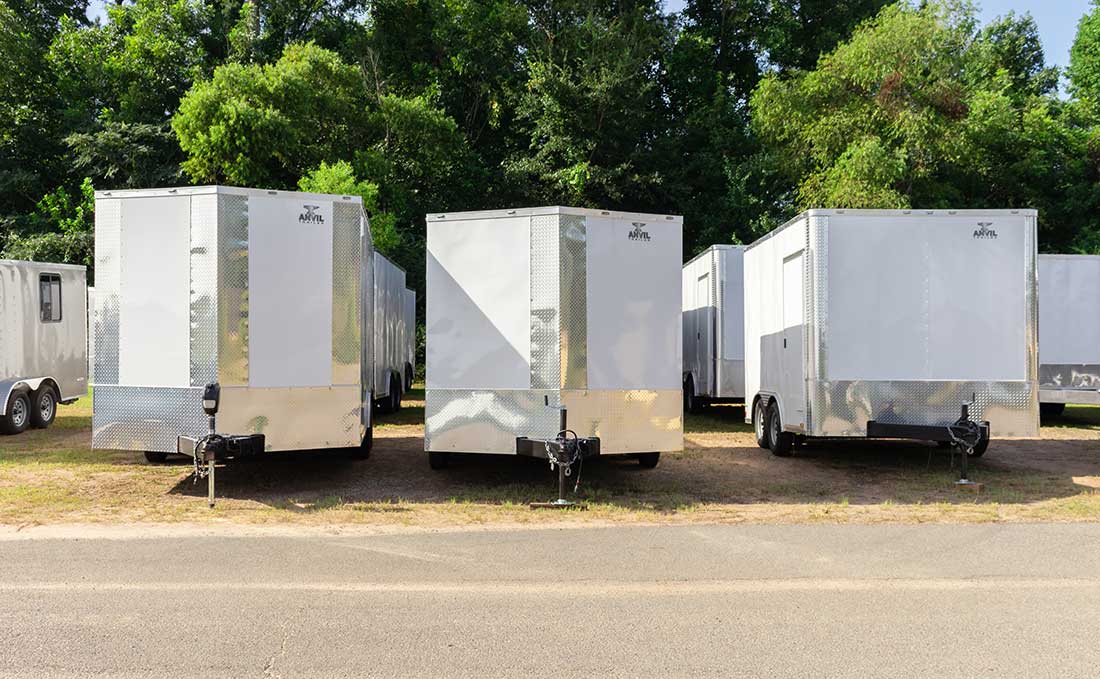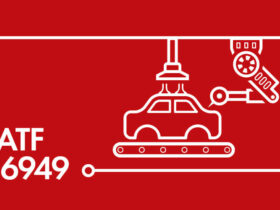Choosing the perfect enclosed cargo trailer involves considering multiple factors, from material and axle type to roof design and tire selection. This guide breaks down the most critical aspects to help you make an informed decision, ensuring your trailer suits your needs, budget, and towing capabilities.
1. Steel vs. Aluminum: Which Material is Right for You?
Both steel and aluminum have their advantages and trade-offs:
- Steel Trailers:
- ✅ Pros: Affordable, resilient to cracks, durable when properly coated.
- ❌ Cons: Heavier, prone to rust without regular maintenance.
- Aluminum Trailers:
- ✅ Pros: Lightweight, rust-resistant, easier to tow.
- ❌ Cons: More expensive, prone to cracking under stress, requires regular inspections.
Recommendation: Choose steel if you need durability at a lower cost and are willing to maintain it. Opt for aluminum if weight and rust resistance are top priorities.
2. Outer Skin Thickness: Durability Matters
The thickness of a trailer’s outer skin impacts both its durability and resistance to temperature-related warping:
- Entry-Level Trailers: Thinner skins, suitable for light use.
- Premium Trailers: Thicker skins, better for heavy use and darker colors to prevent heat warping.
Rule of Thumb: Thicker skin = better durability. If your trailer will see frequent or heavy use, invest in a premium option.
3. Floor Cross Members: Stability and Strength
The spacing and material of floor cross members affect the trailer’s load capacity:
- Standard Spacing: 24 inches on center — suitable for general use.
- Upgraded Spacing: 16 inches or 12 inches on center — ideal for heavy equipment like mowers or lifts.
Material Consideration: 2″x3″ tubing offers excellent strength in tighter configurations.
Recommendation: If carrying heavy loads, upgrade to 16″ or 12″ spacing and consider additional floor reinforcement like diamond plating.
4. Axle Type: Leaf Spring vs. Torsion
Leaf Spring Axle:
- ✅ Pros: Affordable, smooth ride when empty, easy repairs.
- ❌ Cons: Slightly higher ride height, may affect fuel efficiency.
Torsion Axle:
- ✅ Pros: Smoother ride when loaded, independent wheel movement.
- ❌ Cons: More expensive, lower ride height may limit ground clearance.
Recommendation: Choose leaf spring axles for affordability and simplicity. Opt for torsion axles if ride quality and independent suspension are priorities.
5. Tire Selection: Radial vs. Bias Ply
Radial Tires:
- Better traction and fuel efficiency.
- Longer lifespan and smoother ride.
Bias Ply Tires:
- More affordable but less durable.
- Rougher ride and less fuel-efficient.
Recommendation: Radial tires are the clear winner for durability, performance, and long-term value.
6. Nose Type: V-Nose vs. Flat Nose
V-Nose:
- Slightly better aerodynamics and fuel efficiency.
- Improved towing stability.
Flat Nose:
- Maximizes internal storage space.
Recommendation: Choose a V-nose for better towing efficiency and handling, but a flat nose if internal space is a priority.
7. Height Considerations: Standard, Lowered, or Extra Tall?
- Standard Height: Suitable for most uses.
- Lowered Height: Better aerodynamics, reduced drag, improved fuel efficiency.
- Extra Tall: Necessary for larger cargo but may reduce fuel efficiency and increase drag.
Recommendation: Match trailer height to your towing vehicle to minimize drag and optimize fuel efficiency.
8. Roof Type: Flat vs. Rounded
Flat Roof:
- Lower overall trailer height, slightly better aerodynamics.
- May accumulate snow and water.
Rounded Roof:
- Natural snow and rain shedding.
- Slightly more headroom.
Recommendation: Choose rounded roofs for snowy climates and flat roofs if height and drag reduction are your priority.
9. Exterior Finish: Screws vs. Screwless
Screwless Exterior:
- Sleek, professional appearance.
- Easier to wrap with graphics.
- Higher resale value.
Screwed Exterior:
- More affordable.
- Easier to repair individual panels.
Recommendation: Screwless exteriors are ideal for branding and aesthetics, while screwed exteriors suit budget-conscious buyers who value easy repairs.
10. Door Type: Ramp vs. Barn Door
Ramp Door:
- Essential for driving equipment into the trailer.
- Requires ample space to open fully.
Barn Door:
- Better for tight spaces.
- Suitable for general cargo loading.
Recommendation: Choose ramp doors for vehicles or heavy equipment, and barn doors for versatility in compact spaces.
11. Driver’s License Upgrade: Know Your State Laws
In some states, towing trailers with a Gross Vehicle Weight Rating (GVWR) exceeding 2,601 lbs may require a special endorsement or driver’s license class upgrade.
Recommendation: Verify local towing regulations and upgrade your license if necessary to avoid fines or legal issues.
12. Vehicle Registration: Compliance Matters
- Heavier trailers may require upgraded vehicle registration, especially with diesel trucks or heavy-duty models like the F-250.
- Combined weight regulations vary by state.
Recommendation: Check your vehicle manual and local laws to ensure compliance.
13. Expert Assistance: Don’t Hesitate to Ask
When in doubt: Ask Grizzly Trailer Sales!
Recommendation: Reach out to experts to ensure you’re making the best investment for your specific needs.
Final Thoughts
An enclosed cargo trailer is a significant investment, and choosing the right features will ensure safety, efficiency, and longevity. Whether it’s deciding between steel and aluminum, radial and bias tires, or flat and rounded roofs, each choice plays a role in performance and maintenance.
Take the time to evaluate your needs, budget, and typical usage scenarios. When in doubt, consult with professionals to guarantee your trailer meets your expectations and delivers reliable performance for years to come.











